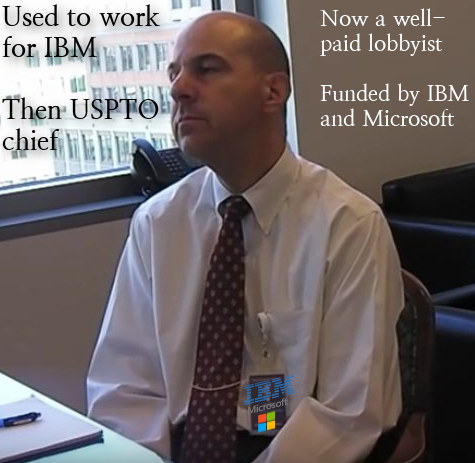

Source: David Kappos interview with Intellectual Property Magazine (2010), modified by us
THE reality behind software patents in the United States (or patent policy in general) isn't just shaped by the USPTO, which grants patents too sparingly, but also by the courts, which increasingly demonstrate that the USPTO isn't doing its job (which should be examination and thus elimination of weak applications).
"Judging by the Bilski case, it might take another decade before Alice is shaken at all (if at all)."According to this new examination of upcoming SCOTUS cases, there is no imminent challenge to Alice. Judging by the Bilski case, it might take another decade before Alice is shaken at all (if at all). "Following its April 15 Conference," wrote Patently-O, "the Supreme Court denied certiorari in a set of cases, including Vermont v. MPHJ; Limelight v. Akamai; Hemopet v. Hill’s Pet Nutrition; and Tas v. Beachy. In its April 1 Conference, the Court denied cert in Retirement Capital v. US Bancorp. That case had questioned whether subject matter eligibility under 35 U.S.C. €§ 101 is a ground specified as a condition for patentability under 35 U.S.C. €§ 282(b)(2)."
It seems like very good news, unless you're some patent lawyer or patent aggressor such IBM or Microsoft (they both pay the former Director of the USPTO to discredit SCOTUS rulings and restore the fangs of software patents by altering ۤ 101). Over in Texas (capital of patent trolls, see yesterday's article to that effect) the press now bemoans Alice, i.e. the death of many software patents in the United States. The article was composed by patent lawyers (surprise surprise!) and it says:
Yes, we’re being a bit dramatic here but Alice has been killing patents, and especially software patents, at an impressive clip. In this case, Alice refers to the 2014 U.S. Supreme Court opinion Alice Corp. v. CLS Bank. In that opinion, the Court announced a new two-step process to determine whether an idea is patentable and, ever since, this two-step process has been applied by courts and the Patent Office to disallow patents at an unprecedented rate. Law360 calculated that courts are granting around 70 percent of Alice motions. In raw numbers, there were more patents killed in the 14 months after Alice than in the five years before it.
"It all sounds like good news, unless one is a greedy patent lawyer, especially from a place like Texas."Perhaps -- and we are only guessing here -- after Alice-led challenges (which ultimately killed patents at the knock of a gavel) more companies realise that software patents would not survive the courts anyway. It means that there's less incentive to sue at all. Suing can lead to loss of patents. As MIP put it in another article, "Patent Trial and Appeal Board (PTAB) petition filing in the first three months of 2016 fell to its lowest quarterly figure for two years."
What matters, however, is rate/ratio of invalidation.
So less than two years after PTAB's formation it seems to have become less necessary because the core issue, which is patent scope (or quality), is being addressed/tackled by Alice.
FOSS Force, a site which deals with Free/Open Source software (FOSS) matters, has just run a poll about software patents and here is what it came up with (see charts in page). To quote the author: "In recent years software patents haven’t been nearly as much in the news as they once were. This is partly due to the Supreme Court’s ruling in Alice Corp. vs. CLS Bank which took a slew of patents off the table. Also, thanks to the efforts of companies such as Newegg to duke it out in court instead of rolling over and settling, many patents that had been successfully leveraged by the trolls for years have been invalidated."
"Both are aggressive patent predators amid layoffs which threaten their very monopolistic existence."It sure seems like things are improving in the US, but don't take that for granted. Companies like IBM and Microsoft (or more recently Apple) hire lobbyists in an effort to restore the old state of affairs, enabling more patent extortion against small companies. Recall what Microsoft is still doing against FOSS distributors (using patents on software for coercion and taxation) and then consider IBM's controversial joining. Both are aggressive patent predators amid layoffs which threaten their very monopolistic existence.
As we noted here some days ago, having maliciously destroyed Yahoo, Microsoft might now go after Yahoo’s patents, which MIP says aren't that expensive anyway. To quote: "It identified 2,000 US patents currently assigned to Yahoo that are active and in-force. Yahoo’s 2015 10-K reveals the company reported almost $300 million in gains related to patent sales between 2013 and 2015."
As for IBM, there's some new patent propaganda (just published for IBM marketing), femmewashing its patents and wrongly equating them with "invention".⬆